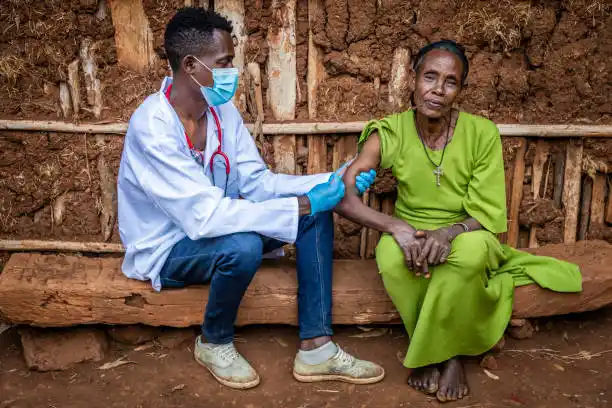What Lessons Can African Nations Learn From The COVID-19 Pandemic

Lawyard is a legal media and services platform that provides…
The COVID-19 pandemic occasioned a huge strain on governance structures and welfare systems across the world. African nations were no exception to this harsh reality. The pandemic brought to light, the inadequacies of many existing systems in Africa; in the management of the healthcare of citizens in African countries as well as the ability of African leaders to handle catastrophic situations effectively, among other things. The pandemic also dealt a devastating blow to the entire world at large, claiming over 6 million lives worldwide as at the 29th December, 2022. The pandemic has however provided Africa and its nations vital lessons, including the need to continually improve on existing systems to remain relevant in a rapidly changing world.
Before the pandemic, many Africans had limited access to healthcare services largely because of poverty, inefficient healthcare administration and the resulting bottlenecks in accessing healthcare. Thus, an already dire situation only got worse with the pandemic. The self-help culture in Africa, coupled with the inadequate healthcare facilities to cater to COVID-19 complications, made it difficult to effectively treat and curb the spread of the virus. It was also difficult to accurately collate and report data on the number of COVID-19 cases in Africa. I believe that some of the difficulty faced in collating the data necessary to be aware of the total number of cases in African countries arose from the inability to trace the exact movements of infected individuals who had been let through African borders, after infected individuals made their way into African countries it would be almost impossible to track the people that they had come in contact with over the course of their stay in the country and until they had been identified as infected .Furthermore, the lack of public education/information about the rapidly changing virus resulted in stigma around the virus in Africa and public hostility towards vaccination. People fear that which they do know or understand, the general lack of information to the public was extremely detrimental as people had begun to construe all sorts of ideas regarding the virus, the rise in conspiracy theories had closed the minds of the public towards genuine information about the virus, its evolution and the vaccines.
The spread of COVID-19 in Africa was enabled by the inability of African nations to enforce regulations necessary for the battle against the virus. Many African states were slow in their responses to the threat of the virus, which in turn left them vulnerable during the pandemic. African countries should learn to be proactive and not reactionary.
To improve healthcare delivery on the continent in the aftermath of the pandemic, African leaders need to prioritize funding and investment in healthcare facilities to guarantee broader access to healthcare. While administrators need to leverage technology for improved service delivery and health awareness, there is also a present need for stronger implementation of public health regulations in Africa. Notwithstanding regulations like compulsory face mask mandate, social distancing protocols, and the installation of mandatory hand washing stations in public places, many Africans acted in direct violation of these regulations without consequences. Laws without consequences for non-compliance are at best a piece of literature.
One other notable impact of the COVID-19 pandemic on African countries is the near-total collapse of education systems. In many developed countries, schools swiftly transitioned to online learning and provided peer and mental health support for students. However, in Africa, teaching in most schools came to a complete standstill for many months as administrators struggled to embrace virtual learning while many students also lamented the prohibitive cost of technology tools and internet broadband in places where school administrators mooted the idea of online learning.
As with the school system, the pandemic also caused a strain on the justice system in Africa. The severity of the pandemic had forced courts to be closed indefinitely to further curb the spread of the virus. One effect was the lack of access to justice for victims of sexual and gender-based crimes which coincidentally was on the rise during the lockdown. Whilst the legal system in Africa presently relies heavily on physical presence, it is imperative to integrate online platforms for passing on judicial decision on cases to ensure the speedy dispensation of justice and fair hearing because justice delayed is often justice denied. Without any doubt, the traditional physical hearing system has proven to be inadequate in the post-COVID era, which is increasingly focused on productivity and conducting day-to-day trials remotely.
Some of the difficulties that render an online hearing system difficult to achieve must be acknowledged. They include limited access to the internet in many parts of Africa, inadequate knowledge of technology by many lawyers and litigants, and unwillingness to embrace change. All stakeholders must address these challenges.
The importance of self-sufficiency is another vital lesson to be learnt by African nations from the COVID-19 pandemic. While many countries reacted swiftly by strengthening existing systems to protect and cater to their citizens, the situation was the complete opposite in many African countries. Countries like the United States and Canada provided a stimulus for their citizens. However, several African countries had no such provisions while a few offered extremely limited welfare packages for their citizens. The unfortunate situation in Nigeria was that the palliatives (food supplies) donated by non-governmental organizations for the public, were hoarded by many government officials which led to looting and a breakdown of law and order.
Also, while developed countries battled with vaccine hesitancy, African nations had to contend with a lack of vaccines, a situation which was worsened by trade barriers. This highlights the need for better collaboration between nations across the world, and African leaders must strive to show that the nations they lead have significant value to offer the rest of the world.
As the world gradually recovers from the impact of COVID-19 on the global economy and how we live, a lingering question that African stakeholders need to find an answer to is, ‘Has COVID-19 strengthened Africa’s preparedness for another pandemic in the future?’ Africa has the potential to take the world by storm with ingenious solutions to real-world problems that are being faced in Africa and across the world.
Aiyegbayo Olaoluwakiitan Peter,
Year 2 Law student, Lancaster University Ghana.
kaiyegbayo@gmail.com
29th December, 2022.
Lawyard is a legal media and services platform that provides enlightenment and access to legal services to members of the public (individuals and businesses) while also availing lawyers of needed information on new trends and resources in various areas of practice.













